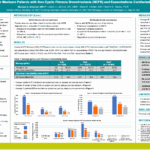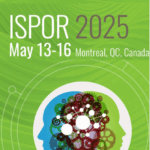Dr. Naomi Sacks, BRLS Vice President in our Pharmaceutical Commercialization practice, is a co-author of a study recently published in JAC-Antimicrobial Research. Dr…. read more
Author Archives: ricknelson
New Hire Amanda Burns Expands ToxStrategies’ Litigation Support Expertise
Growing Need for Cumulative Exposure and Cumulative Risk Assessment
Understanding the Full Picture of Chemical and Environmental Exposures Regulators, industry, and the public are increasingly focused on the combined effects of multiple… read more
MTAP is a promising target for cancer therapy.
EpidStrategies’ scientists Mina Suh, Naimisha Movva, and Sue Pastula have authored a new systematic literature review in Cancer Treatment and Research Communications. This… read more
BlueRidge Life Sciences’ Dr. Naomi Sacks is at ISPOR!
EpidStrategies Scientists in Collaboration with Duke University and the Central Brain Tumor Registry of the United States are Presenting at the 2025 SNO Pediatric Neuro-Oncology Conference
In the United States, the most common childhood central nervous system cancer is pediatric low-grade glioma, but there are no standardized coding definitions… read more
BlueRidge Life Sciences is at ISPOR 2025 in Montreal!
BlueRidge scientist Dr. Naomi Sacks co-authors study ranked in top 10% of most-viewed Obesity Science & Practice articles
BlueRidge Life Sciences Pharmaceutical Commercialization’s Dr. Naomi Sacks’s work published in Obesity Science & Practice on behalf of The Obesity Society was recently… read more
Systematic review article accepted for publication
A publication titled, “Benefit-Risk of Coffee Consumption and All-Cause Mortality: A Systematic Review and Disability Adjusted Life Year Analysis,” by ToxStrategies authors Candace Doepker, Naimisha Movva, Sarah Cohen [no longer with ToxStrategies], and Daniele Wikoff, has been published by Food and Chemical Toxicology. The paper is unique, in that a quantitative analysis was used within the benefit-risk assessment for foods (BRAFO) paradigm to assess potential harm and/or benefits of drinking coffee. In the paper, the BRAFO framework is applied to guide risk managers in decision making; in that context, the authors conclude that any policy that directs consumers to avoid drinking coffee may be a detriment to the overall health of the population, given the substantial potential benefits of coffee consumption on all-cause mortality for adults.
The published manuscript is available from the journal.
EpidStrategies announces seven new publications of RSV research
Several EpidStrategies scientists are among the collaborating authors of seven new studies on respiratory syncytial virus (RSV) published in a special supplement to the Journal of Infectious Diseases. The authors include Ms. Mina Suh, Ms. Naimisha Movva, Ms. Xiaohui Jiang, Ms. Heidi Reichert, and Ms. Lauren Bylsma, and the studies describe the morbidity and mortality burden of RSV among US-born infants and children under 5 years old.
RSV affects nearly all infants and children <5 years old. Our studies confirm that RSV is the leading cause of infant hospitalizations in the US. Even those born full term and otherwise healthy may be at risk of developing serious illnesses from RSV, including pneumonia. In addition, infants insured with Medicaid experience twice as many hospitalizations and emergency-room visits as privately insured infants, indicating potential health-care equity issues.
This journal supplement is the culmination of an ongoing research program that involved EpidStrategies scientists and academic and industry collaborators. Please contact Mina Suh (msuh@epidstrategies.com) for more information about this work.
The seven publications, listed below, are available from the journal via open access.
- Suh M, Movva N, Jiang X, Bylsma LC, Reichert H, Fryzek JP, Nelson CB. 2022. Respiratory syncytial virus (RSV) is the leading cause of United States infant hospitalizations 2009–2019: A study of the National (Nationwide) Inpatient Sample. J Infect Dis 226(Suppl 2):S154–S163, open access.
- Movva N, Suh M, Reichert H, Hitze B, Sendak MP, Wolf Z, Carr S, Kaminski T, White M, Fisher K, Wood CT, Fryzek JP, Nelson CB, Malcolm WF. 2022. Respiratory syncytial virus during the COVID-19 pandemic compared to historic levels: A retrospective cohort study of a health system. J Infect Dis 226(Suppl 2):S175–S183 open access.
- Suh M, Movva N, Jiang X, Reichert H, Bylsma LC, Fryzek JP, Nelson CB. 2022. Respiratory syncytial virus burden and healthcare utilization in United States infants, <1 year of age: Study of nationally representative databases, 2011–2019. J Infect Dis 226(Suppl 2):S184–S194, open access.
- Suh M, Movva N, Bylsma LC, Fryzek JP, Nelson CB. 2022. A systematic literature review of the burden of respiratory syncytial virus disease and health care utilization among United States infants younger than 1 year. J Infect Dis 226(Suppl 2):S195–S212, open access.
- Movva N, Suh M, Bylsma LC, Fryzek JP, Nelson CB. 2022. Systematic literature review of respiratory syncytial virus laboratory testing practices and incidence in United States infants and children <5 years of age. J Infect Dis 226(Suppl 2):S213–S224, open access.
- Reichert H, Suh M, Jiang X, Movva N, Bylsma LC, Fryzek JP, Nelson CB. 2022. Mortality associated with respiratory syncytial virus, bronchiolitis, and influenza among infants in the United States: A birth cohort study from 1998 to 2018. J Infect Dis 226(Suppl 2):S246–S254, open access.
- Bylsma LC, Suh M, Movva N, Fryzek JP, Nelson CB. 2022. Mortality among United States infants and children under 5 years of age with respiratory syncytial virus and bronchiolitis: A systematic literature review. J Infect Dis 226(Suppl 2):S267–S281, open access.



